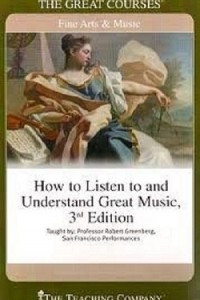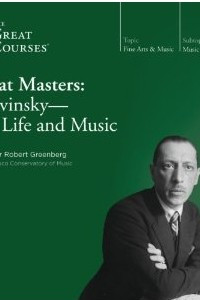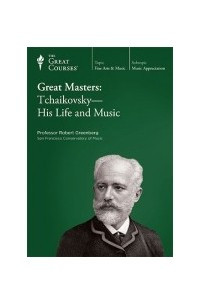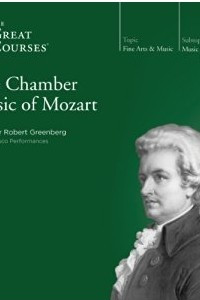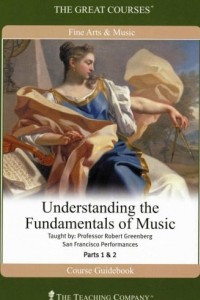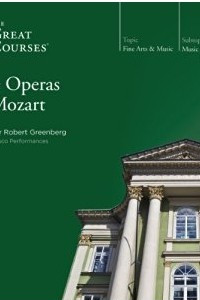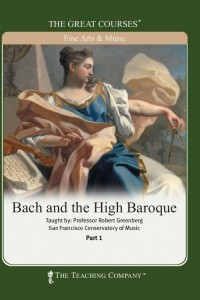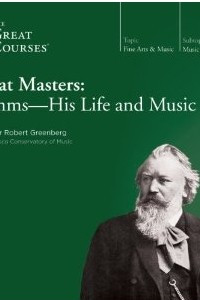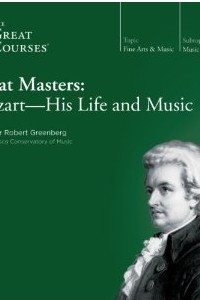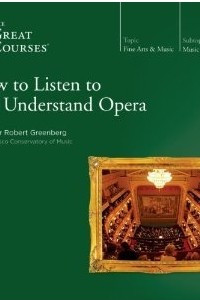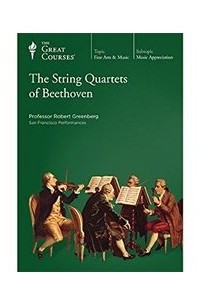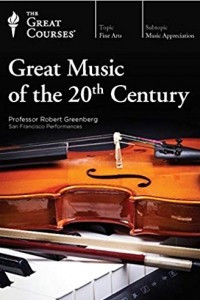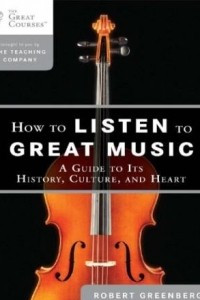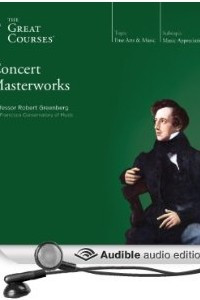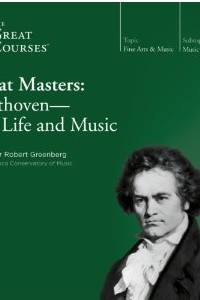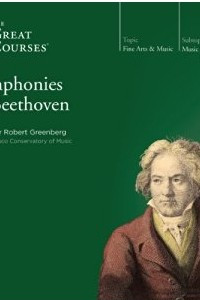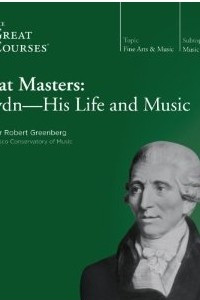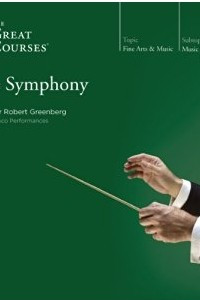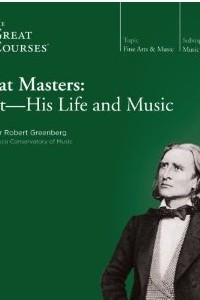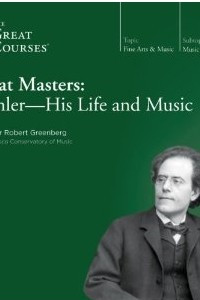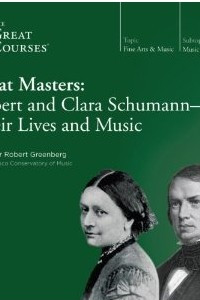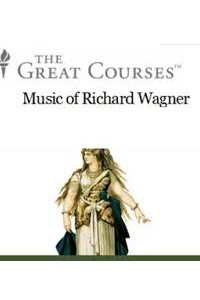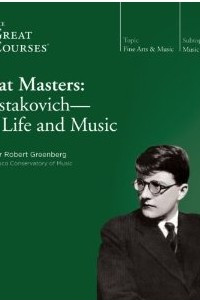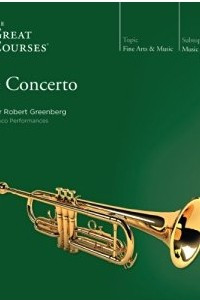- Главная
- Авторы
- Robert Greenberg
- Книги Robert Greenberg
Книги Robert Greenberg
Robert Greenberg - автор 25 книг. Из известных произведений можно выделить: How to Listen to and Understand Great Music (Great Courses), The Chamber Music of Mozart, The Operas of Mozart. Все книги можно читать онлайн и бесплатно скачивать на нашем портале.
Great music is a language unto its own, a means of communication of unmatched beauty and genius. And it has an undeniable power to move us in ways that enrich our lives - provided it is understood. If you have ever longed to appreciate great concert music, to learn its glorious language and share in its sublime pleasures, the way is now open to you, through this series of 48 wonderful lectures de...
Stravinsky composed what is arguably one of the two most important musical compositions of the twentieth century, The Rite of Spring. He forged a new "musical language" to portray the sense of the ballet's primitive and earthy theme. More than a dozen excerpts of Stravinsky's works are examined.
8 lectures | 46 minutes per lecture The life of Peter Ilyich Tchaikovsky (1840–1893) exhibits as close a link as you will find anywhere between an artist's inner world and the outward products of that artist's creative activity. As a man, Tchaikovsky was defined by and indivisible from his music, which became an outlet for all the shifting moods of his turbulent soul. As Professor Robert Greenb...
Nowhere is Mozart's maturity and mastery more apparent than in the chamber music he wrote during the last 10 years of his life. These 16 lectures take you deep inside the structure of Mozart's chamber masterworks to reveal his hand at work. This is an amazing opportunity to hear, study, and enjoy a selection of immortal musical compositions that Professor Greenberg calls "a blessing of i...
We all know that beneath the surface of music, beyond the joy or excitement or even heartache that this beautiful language of sound can stir within us, lies the often mysterious realm of music theory—a complex syntax of structural and instrumental resources that composers may draw on. No matter what kind of music we listen to—symphony or string quartet, saxophone solo or vocal ballad, hip hop o...
When Wolfgang Amadeus Mozart died in 1791 at the age of just 35, he nonetheless left behind the defining composition in every available musical genre of his time: symphony, chamber music, masses, and above all - opera. Opera was the prestige genre of the era, and the thought of it, Mozart wrote, made him "beside myself at once." It was a form he loved dearly, depending on it heavily for personal, ...
extraordinary sweep of Bach's music and understand his compositional language - whether you're a devoted admirer or a casual listener. You'll place Bach in context by tracing the musical traditions and composers from whom he drew his inspiration and learning how Bach absorbed these influences to become the transcendent composer of the High Baroque. Part I of these lectures gives an ...
Johannes Brahms was a man of contrasts. His serious Teutonic music was balanced by joyful dance music. His miserliness with himself by exceeding generosity with family and associates. His kindness to working people with a biting, malicious wit reserved for those he encountered in artistic and aristocratic circles. He was not an easy man to know, destroying a good deal of his own work and almost...
Even from the perspective of time, it is nearly impossible to grasp the full contribution made to music by Wolfgang Amadeus Mozart in his brief and glorious life. He composed his first symphony at the age of 8 and reached full artistic maturity by the time he was only 20. And when he died at the age of 35, he left a legacy of more than 600 works of brilliance - symphonies, chamber music, operas, a...
How to Listen to and Understand Opera (32 lectures, 45 minutes/lecture) Course No. 740
In his 16 quartets for two violins, viola, and cello, Beethoven created a Mount Everest for string players and some of the most sublime, unforgettable music ever written. In this musically rich 24-lecture series, Professor Greenberg guides you in a deep encounter with these majestic works of art, offering you the rare opportunity to grasp the musical riches and spiritual greatness of the quartets ...
The 20th century was a hotbed of musical exploration, innovation, and transformation unlike any other epoch in history. Ranging across the century in its entirety, these 24 lectures present a musical cornucopia of astounding dimensions—a major presentation and exploration of the incredible brilliance and diversity of musical art across a turbulent century. Using a chronological approach, you’ll ex...
From one of the most trusted names in continuing education-the knowledge you need to unlock "the most abstract and sublime of all the arts." Whether you're listening in a concert hall or on your iPod, concert music has the power to move you. The right knowledge can deepen the ability of this music to edify, enlighten, and stir the soul. In How to Listen to Great Music, Professor Robert Greenbe...
ave you ever thought about the creative process that boiled inside geniuses like Mozart, Beethoven, Dvorák, Strauss, Brahms, Mendelssohn, or Liszt - or any composer, for that matter? What goes through a composer's mind when a musical composition is being set to paper? Are those magical weeks or months spent in an agonizing creative blur of ideas first tried and then discarded, or is it a matter...
High quality, university level teaching! Course Lecture Titles 1. The Immortal Beloved 2. What Comes down Must Go up, 1813-1815 3. What Goes up Must Come down, 1815 4. Beethoven and His Nephew, 1815-1819 5. Beethoven the Pianist 6. Beethoven the Composer, 1792-1802 7. The Heroic Ideal 8. Two Concerts, 1808 and 1824
Ludwig van Beethoven is justifiably acclaimed as one of the most revered composers in the history of Western music-a genius once characterized as a "Titan, wrestling with the gods." There is no better way for you to understand the full impact of that description than to not only listen to all nine of his magnificent symphonies, but to do so with a full understanding of what this great composer was...
lmost from the moment it was first set to paper, the music of Franz Joseph Haydn (1732-1809) - technically superb, rich in quality, and widely imitated - has exemplified the Classical style, creating not only the Classical-era symphony but setting the standard, through his own 68 string quartets, against which that form has ever after been judged. And yet Haydn, despite the influence left by mo...
From its humble beginnings in the 17th-century Italian opera overture and the Baroque ripieno concerto, the symphony has evolved into one of the longest lived, and perhaps the most expressively inclusive, genres of instrumental music. Along the way, it has embraced nearly every trend to be found in Western concert music. In this series of twenty-four 45-minute lectures, Professor Greenberg guid...
More than anyone before him - more than Beethoven, Byron, even the preternatural Paganini - it was Franz Liszt who created one of the most enduring archetypes of the Romantic era: that of the artist, "who walks with God and brings down fire from heaven in order to kindle the hearts of humankind." An innovative composer both for his own instrument and on an orchestral scale, Liszt was without a ...
More than many other composers, Gustav Mahler's works are highly personal expressions of his inner world, a world of overwhelming alienation and loneliness - "thrice homeless," in his own words, "as a Bohemian in Austria, as an Austrian among Germans, as a Jew throughout the world - everywhere an intruder, never welcomed." Incredibly, Mahler was able to draw upon the diversity of this worl...
In all the annals of Western music, there has never been a couple like the Schumanns: he a pioneering critic and composer (the only ever to achieve greatness as both), she one of the leading concert pianists of Europe, as well as a composer of no small talent herself. This series of eight lectures by an award-winning composer and acclaimed teacher includes excerpts of works by both of the Schum...
Richard Wagner was one of history's greatest composers, a theater artist of extraordinary genius and vision, and one of the most controversial characters in the entire pantheon of Western art. More than a century after his death, his legacy is still debated, his influence still felt in our very conception of Western music and in the contemporary forms of opera and the complete spectrum of theater ...
Dmitri Shostakovich is without a doubt one of the central composers of the 20th century. His symphonies and string quartets are mainstays of the repertoire. But Shostakovich is also a figure whose story raises challenging and exciting issues that go far beyond music: they touch on questions of conscience, the moral role of the artist, the plight of humanity in the face of total war and mass oppres...
The Italians have a word for the sense of dazzling beauty produced by effortless mastery: sprezzatura. And perhaps no cultural form associated with Italy is as steeped in the love of sprezzatura as opera, a genre the Italians invented. No composer has embodied the ideal of sprezzatura as magnificently as Giuseppe Verdi, the gruff, self-described "farmer" from the Po Valley who gave us 28 operas an...
The concerto offers a kind of unique excitement no other instrumental music can match. Where a symphony enthralls us with its thematic variations and development, a concerto gives us human drama - the exhilaration of a soloist or group of soloists ringing forth against the mass of the orchestra. In 24 musically rich lectures, Professor Greenberg provides a guided tour of the concerto, from its ...

